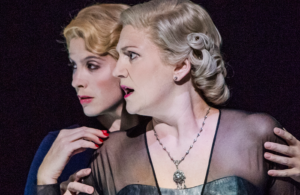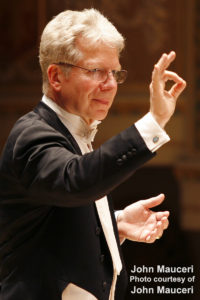
Even the mirrors lie in Samuel Barber’s opera Vanessa.
At least that’s the world created in the new Glyndebourne Festival staging, which is likely to raise the profile of an opera that, sad to say, needs it.
The production seemed to come out of the blue. Though the indoor intimacy of Vanessa fits this smallish, rural-England opera house perfectly, it’s not characteristic of Glyndebourne, whose usual summer seasons combine very old and brand-new opera, plus standard works re-explored with unusual theatrical integrity. Samuel Barber (1910-1981) is enjoying increasing currency in America, at least some of the public knows there’s much more to him than his Adagio for Strings. But I rarely see his music on British concert or radio programs, much less on Medici.tv, which streamed the opera live this week and will keep it available (www.medici.tv/en/).
Vanessa was long admired as a coda to pre-World War I romanticism, not as a child of 1958 (the year of its premiere), a time when the rest of the contemporary music world seemed preoccupied with esoteric compositional systems. Yet Glyndebourne is advertising the opera as being ahead of its time in its portrayal of the female experience. It’s also a work “from the age of Hitchcock” – a world in which affairs of the heart are mercenary and where mirrors, and most sources of objective reality, are fountains of deception.
The production looked and behaved like Vanessa should, slightly updated to the era of Downton Abbey but still a dark, stately world of reclusive gentility that is said to be inspired by Isak Dinesen’s Seven Gothic Tales. To me, the opera itself feels like a Chekhovian netherworld, with with a touch of soap opera, an occasional Slavic flavor to the music, and a setting in a northern climate where people travel by sleigh. The scenario’s vagueness of time and place can seem inauthentic, subtly undermining the opera’s dramatic credibility. The tidy solidity of the Gian Carlo Menotti libretto and lyrical conservatism of Barber’s score can add to the sense that this is a New World counterfeit of Old World culture.
But what was once a minus may now be a plus.
Keith Warner’s direction and Ashley Martin-Davis’s set design galvanized that netherworld quality, never asking you to believe that Vanessa takes place in reality; it’s all the sumptuously upholstered artificial construction of a deeply damaged psyche. We aren’t expected to validate the title character’s obsession with a man who abandoned her decades before.
Aided by the emotional amplification that comes with conductor Jakub Hrůša’s heated vision of Barber’s saturated, passionate harmonies, Emma Bell, in the title role, moves from pent-up longing to near-terrifying hysteria. (And that’s only Scene One.) Combined with pale costuming and makeup, Bell is like a ghost who doesn’t know she’s dead. This is the sort of madness that becomes possible with physical separation from the world at large and the money to be surrounded with people who always say “yes.” And there’s nothing like madness to aid the suspension of disbelief.

What arrives at Vanessa’s estate on this early-winter night is not Anatol, her lover from the past, but his son – a soldier of fortune, eager to take whatever he can get. At first, that whatever is Vanessa’s niece, Erika. Then he targets Vanessa herself: she is a baroness, and one who deludes herself with grand-but-vague words like “destiny.” The raciness of the older woman/younger man dynamic that had been floating around the theater world in the 1950s plays of Tennessee Williams no longer packs much punch. So the junior Anatol isn’t a device anymore. He’s a figure of mystery.
Who is he, really? He tells everyone quite directly. Never does he promise eternal love. He’s brutally realistic – in this production, Edgaras Montvidas puts his feet up on the furniture, smokes often, helps himself to champagne and generally seems to be casually claiming what he thinks is his. And the opera’s women, hothouse romantics all, have strangely oblique reactions to his truth.
Eloquent, meaningful singing was a priority over tonal beauty; it had to be that way, especially with Virginie Verrez in the role of Erika, though Donnie Ray Albert made a pretty wonderful vocal impression as The Old Doctor.
The opera’s orchestral world had a more subtle role in this production’s new-ish voice. As much as I’ve loved the original Metropolitan Opera recording under Dmitri Mitropoulos, that conductor and orchestra were looking backward from Barber to what they already knew. Thus, any number of moments in the score can sound conventional or secondhand – at least when there’s not a conductor like Leonard Slatkin at the helm. His Chandos-label recording represents an important landmark in the performance evolution of Vanessa, and I’m willing to bet that it played a role in the decision to mount this production. To his immense credit, Hrůša approached the score with fresh, youthful eyes, and he seems to hear the whole opera as matter of life and death.
As a result, Vanessa‘s conclusion feels more tragic than that of Tosca. Both endings are honorable suicides of sorts: Tosca jumps off the parapet, partly for a political cause; Erika lets Vanessa run off with Anatol and becomes a recluse, even though she could’ve had him for herself had she broken the news that he was the father of her miscarried baby. Erika’s end is a living death, much more psychologically complicated than Tosca’s – and one that has haunted my waking hours. Does she accept that her aunt is being used by Anatol because he stands to give her at least a few years of happiness she wouldn’t otherwise have had? I suppose that’s where Vanessa becomes an opera from the age of Hitchcock. Nothing feels tidy or conclusive.

Something similar happens with Marc Blitzstein’s The Cradle Will Rock: The full score with its original orchestrations was presented – thanks to some mighty efforts by conductor John Mauceri – by Opera Saratoga last summer, in an extremely well-received production whose musical attributes are now preserved on a Bridge-label recording. I saw the production live, but, due to a ticket snafu, I was placed in an acoustically disadvantageous corner of the Spa Little Theater.
Revisiting The Cradle Will Rock on CD was a revelation. Once you get used to Blitzstein’s American-Brecht-style dramaturgy, with its broadly drawn social ecosystem of greed and injustice – and once you take in the many musical and dramatic details that come with hearing the complete score – you begin to see how clearly the piece speaks to our time. Its manner is 1930s-Great-Depression, but when the heroine sings “Nickel Under the Foot,” she now speaks for a current generation of people who are facing a lifetime of student loan debt because, amid the rosy Bureau of Labor statistics, so many people are grossly underemployed.
So open the cuts. Raise the heat. And see how neglected operas by reputable composers can truly come to our emotional aid.


Wonderful post with great insights!